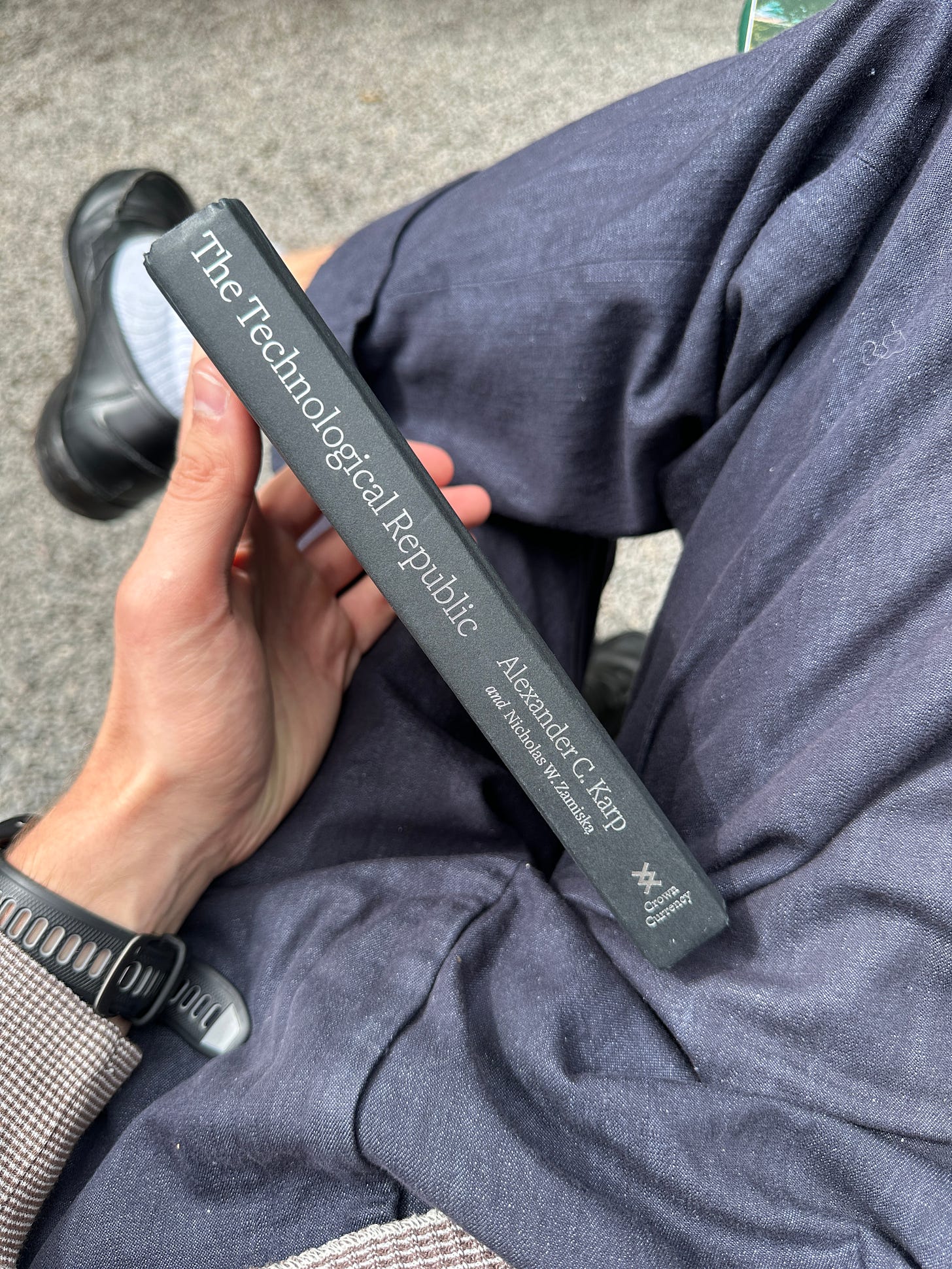Minted Book Club: The Technological Republic
A few months back, I mentioned being halfway through Addiction by Design: Machine Gambling in Las Vegas by Natasha Dow Schüll, and the response made it clear we should probably turn this into a regular thing. Unfortunately, it took me about two months to get through the last 50 or so pages because it felt like a constant rehashing of everything I'd read up until that point. That being said, I have fallen quite behind on my "book per month" goal.
Last weekend, I had a wedding to attend in Washington, DC, and on the drive down, I decided to put my next book (after finally finishing Addiction by Design) on audio and listened to a good two-thirds of it. Yesterday, I finished it in the park.
I then picked up Alex Karp's book expecting a Silicon Valley memoir (which I don’t even mind). What I got instead was something closer to a philosophical manifesto wrapped in the frustrations of someone who's spent twenty years watching brilliant people "waste" (his framing, not mine) their potential on "trivial" problems.
Karp runs Palantir, the company that builds software for intelligence agencies and military operations—not exactly the typical Silicon Valley darling. Which is probably why his critique of tech culture hits so hard.
The book's central argument is uncomfortable: while there are still brilliant engineers tackling genuinely hard problems, Karp believes that too much of our top talent has been pulled toward optimizing engagement and consumption rather than solving more fundamental challenges. The incentives have shifted from building technologies that change the world to building apps that capture attention.
The Status Game Problem
One thing that struck me about Karp's analysis is how much of Silicon Valley's culture comes down to what problems are considered prestigious to work on. He points to the 2018 Google employee pushback against a Pentagon contract as an example of how certain types of work have become culturally discouraged.
His observation is that there's a disconnect between the problems that get celebrated in tech circles versus those that might have broader societal impact. Consumer applications often get more recognition and career advancement opportunities than infrastructure or institutional technology work.
Karp argues this creates a talent allocation problem. Regardless of your views on specific defense applications, there's a question about whether our most capable engineers are working on the most impactful challenges. The status and recognition systems in tech may be steering people away from complex problems that actually need solving.
The Craft vs. Scale Tension
Karp talks about how the most important innovations require long-term thinking, patient capital, and a willingness to work on problems that might not pay off for years.
Yet, it seems like the entire startup ecosystem is built around rapid iteration, quick wins, and fast exits. VCs want to see hockey-stick growth curves, not decade-long research projects.
This tension plays out in everything we do at Minted, though I should note that the stakes and complexity of what we face pale in comparison to what Karp deals with at Palantir. When you're building software that intelligence agencies rely on or systems that could impact military operations, the consequences of getting things wrong involve human lives. The pressure to be right and the time needed to ensure reliability operate on a completely different scale than optimizing product-market fit for consumer goods.
Still, the underlying tension exists across industries. There is always the temptation to focus on whatever drives the most immediate growth: more colorways, faster product cycles, broader appeal. But the stuff that actually matters (new material technologies, better manufacturing processes, fundamental improvements in how things are made) takes time.
Karp's argument is that we've systematically deprioritized the hard, important work in favor of the easy, scalable work. The stakes vary dramatically depending on what you're building, but the pattern holds.
The National Project Question
Karp argues that America's technological breakthroughs historically came from large-scale, coordinated efforts with clear objectives. The internet, GPS, touch screens—much of it started as military research that eventually found its way to consumers.
But that kind of patient, long-term investment has gotten much harder to pull off. How do you fund work that might take decades to pay off?
Different people will have different views on which problem sets or challenges should be focused on and who should coordinate those efforts. Maintaining focus on complex, long-term work in a system that rewards quick wins will be a significant challenge—one that yearns for disruptive companies or individuals willing to swim against the "quick win" culture.
Where Do We Go From Here?
Karp doesn't offer easy solutions, and honestly, I'm not sure there are any. But reading this made me think about how we decide what's worth building at Minted. There is a tendency to be pushed toward whatever's easiest to scale and monetize quickly. While there is some value in that, fighting against it requires being deliberate about what problems you're actually trying to solve. I hope to bring that deliberate intentionality to what we are doing at Minted.
Reading anything? Thoughts on the above? Drop them below




This may become a bit of a snowball, since the focus on capturing and holding an ever-decreasing attention span means that fewer and fewer people are able and willing to tackle hard problems. You not only need people who want to solve these problems but people who have the mental bandwidth to do so, which unfortunately is becoming less common.
The first few pages absolutely blew me away. Great book.